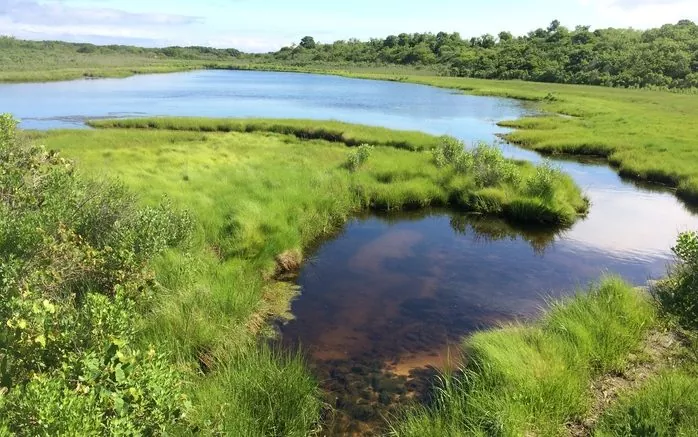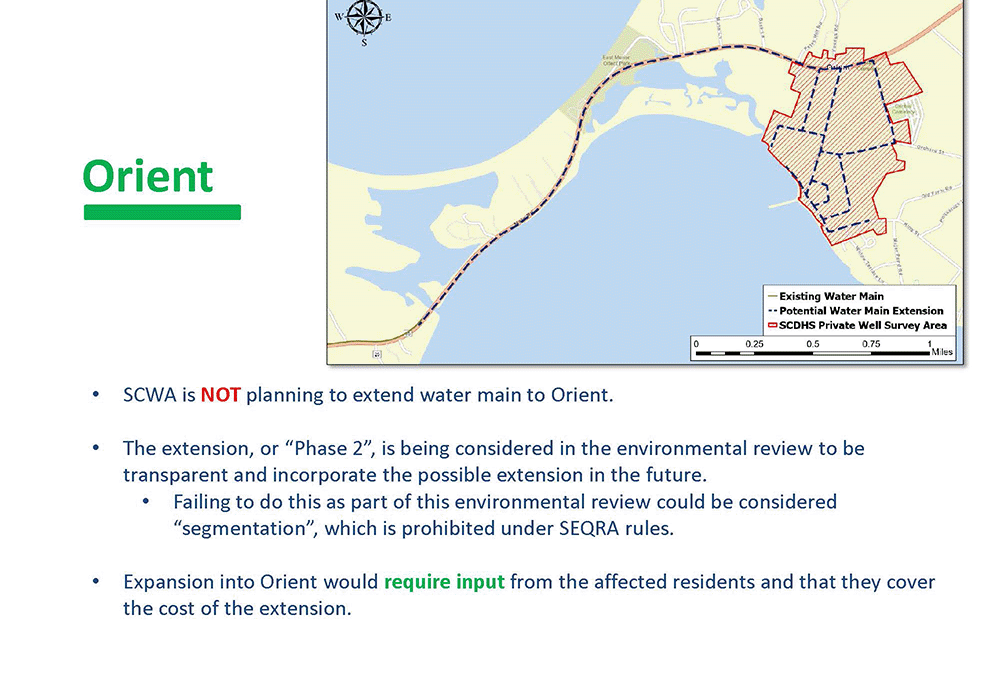Best Practices to Protect Water Resources
Orient is surrounded by water and has only one, thin freshwater aquifer from which all of our water is drawn. To preserve the health of our ground water and the surrounding water bodies, we need to be mindful of the fact that what we put down our drains or onto our lawns ends up first in our drinking water and eventually in the bay or Long Island Sound. Several community members have asked about best practices, so here are some helpful resources for maintaining a healthier home and hamlet:
What can you do?
Use safer personal care and cleaning products:
The cleaning products you use inside can impact your environment. Careful selections of non-toxic products can both protect the aquifer, source of your drinking water, as well as your health by improving indoor air quality.
- Choose cleansers that are certified by Green Seal or Ecologo, free of fragrance and free of triclosan and quaternary ammonium compounds. Avoid products with ammonia and chlorine bleach.
- Avoid scented products, including laundry aids.
Find recommended personal care and other household products. The environmental working group and EPA have rated thousands of products:
- Environmental Working Group https://www.ewg.org/guides/
cleaners/ - EPA https://www.epa.gov/
saferchoice/products - The Spruce https://www.thespruce.com/the-
best-septic-safe-household- cleaning-products-4175069
Properly dispose of pharmaceuticals and hazardous products:
Never dispose of pharmaceuticals or hazardous waste materials by flushing them down the toilet or pouring them down the drain. Don’t be fooled by the appearance of storm water drains on the street– these are not sewered drains. There are no sewers in Southold Town except in Greenport Village. Your home does not have sewers that treat your wastewater! We all have septic tanks or cesspools, which do little to no filtration of harmful contaminants.
Narcotics can be disposed of at the Police Department, and most other pharmaceuticals can be put in the trash or taken to the ELIH pharmacy for disposal.
Southold Transfer Station (aka “the dump”) accepts hazardous waste on hazardous waste days four times per year. On those days, they will accept oil-based paint, paint thinner, toilet cleaner, pesticides, herbicides, carpet cleaner, kerosene, motor oil, and other hazardous substances. Proof of residency may be requested, but permits are not required.
For a full list of accepted hazardous materials visit
http://www.southoldtownny.gov/
Maintain or update your wastewater system
Maintain your cesspool or septic system—or, better yet, consider installing an advanced septic system to reduce the nitrogen released by your wastewater disposal system. Find out more about these systems here: https://reclaimourwater.info/
Pick up after your pet
Pet waste contains harmful bacteria and nutrients and other contaminants that could reach the water. While your dog may only contribute a small amount of waste-it adds up.
Avoid PFAS-containing products and get your water tested
Orient’s aquifer has pockets of high levels of Per-and Polyfluoroalkyl Substances (PFAS) chemicals. While the major sources are being investigated by NYSDEC, every household is likely to contribute to these “forever” chemicals, which can cause serious health effects. Fabrics with stain/waterproof repellent coatings, such as Teflon, Scotchgard, Stainmaster, Polartec, or Gore-Tex will likely contain PFAS chemicals. They are found on pan coatings, fast-food wrappers, pizza boxes, some watch bands, and even Oral-B glide floss. Choose personal care products without “PTFE” or “FLUORO” Ingredients. Check “performance” fabric specifications when purchasing furniture.
The Suffolk County Department Health Services is still providing free PFAS testing within the Orient Village survey area and is now including PFAS testing for everyone in the $100 private well testing program. Call (631) 852-5810 for more information. Make sure you request that PFAS testing is included in your test.
Avoid products with 1,4-Dioxane
This emerging contaminant of concern can be found in many personal care and household cleaning products. Since it is a manufacturing byproduct in many of these products, it is not included in the list of ingredients. Read more about it in this recent Riverhead Local article:
https://riverheadlocal.com/
Limit the use of fertilizer, herbicides, pesticides and fungicides
Remember that everything you put on your lawn can seep into the aquifer. Reduce or, better yet, eliminate fertilizer use. Don’t apply fertilizers when rain is forecast, as it will likely just leach into the aquifer or wash away as stormwater run-off. Leaving at least 3 inches of grass when mowing will help roots to remain strong. Grass clippings left on the lawn can restore nitrogen naturally. Suffolk County has a ban on fertilizer use between November 1 and April 1. See the Suffolk County’s website for best practices:
http://healthylawns.
This brochure from the Peconic Estuary Partnership is a useful resource for learning alternatives to pesticide use: Pesticides Near the Bay – Peconic Estuary Partnership. If you feel that you MUST have your lawn sprayed for ticks or other pests, never allow the application of spray just before a heavy rain or under windy conditions.
Limit household water consumption
With only one thin aquifer to draw from, water is a precious resource. Our aquifer is very vulnerable to saltwater intrusion from rising sea levels, flooding and/or excessive pumping. To reduce use, consider installing EPA Watersense fixtures.
https://www.epa.gov/watersense
Limit irrigation
While much of the water we use indoors returns to the aquifer as wastewater, much of the water used outdoors is lost to evapotranspiration. On the East End of Long Island, we use more water per household than the national average. One of the biggest culprits is lawn irrigation. Too much water can actually be detrimental to the health of your lawn. Lawns only need about one inch of water a week, which rain usually provides. Also, a brown lawn will recover. Ideally irrigation should only be used to establish plants – one year for grass, two for bushes, and three for trees. See the County’s guidance on best practices for lawn watering:
Healthy Lawns, Clean Water (suffolkcountyny.gov)
https://healthylawns.
You might also consider reducing the turf area and planting native species or installing a rain garden. A rain garden is a wonderful way to capture run-off from your home, diverting it to a pleasurable amenity. An excellent example has been installed at the North Fork Audubon Society, Roy Latham Nature Center at 65275 County Road 48 in Greenport. For more information on which plants do well in a rain garden, see Cornell Cooperative Extension’s guidance.
Recent Happenings

Southold Zoning Update Project – July 29, 2025 3-4pm

Orient Water Resources Study Is Finally Here!


